#Rwanda Genocide 1994
Explore tagged Tumblr posts
Text
Kagame blames the world's inaction as Rwanda commemorates the 1994 genocide.
Rwandan president Paul Kagame. Courtesy image. Getty ImagesRwanda’s President Paul Kagame said the country was “humbled by the magnitude of our loss” Rwanda’s president said the international community “failed all of us”, as he marked 30 years since the 1994 genocide that killed around 800,000 people. President Paul Kagame addressed dignitaries and world leaders who had gathered in Rwanda’s…
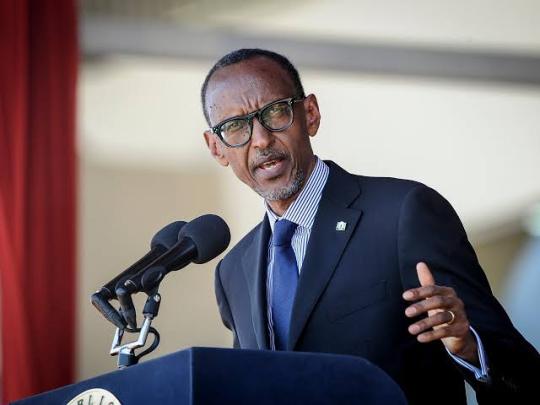
View On WordPress
0 notes
Text
The utopian premise of the Genocide Convention had been that a moral imperative to prevent efforts to exterminate whole peoples should be the overriding interest animating the action of an international community of autonomous states. This is a radical notion, fundamentally at odds, as so much of the internationalist experiment has proven to be, with the principle of sovereignty. States have never acted for purely disinterested humanitarian reasons; the novel idea was that the protection of humanity was in every state’s interest, and it was well understood in the aftermath of World War II that action against genocide would require a willingness to use force and to risk the lives of one’s own. The belief was that the price to the world of such a risk would not be as great as the price of inaction. [...] And I wondered: Can we imagine such an outcome today?
Philip Gourevitch, We Wish to Inform You that Tomorrow We Will Be Killed with Our Families
#this book goes HARD#it's obviously about the 1994 rwanda genocide but it remains staggering relevant. unsurprisingly#Philip Gourevitch#history#book talk#rwanda#genocide
49 notes
·
View notes
Text
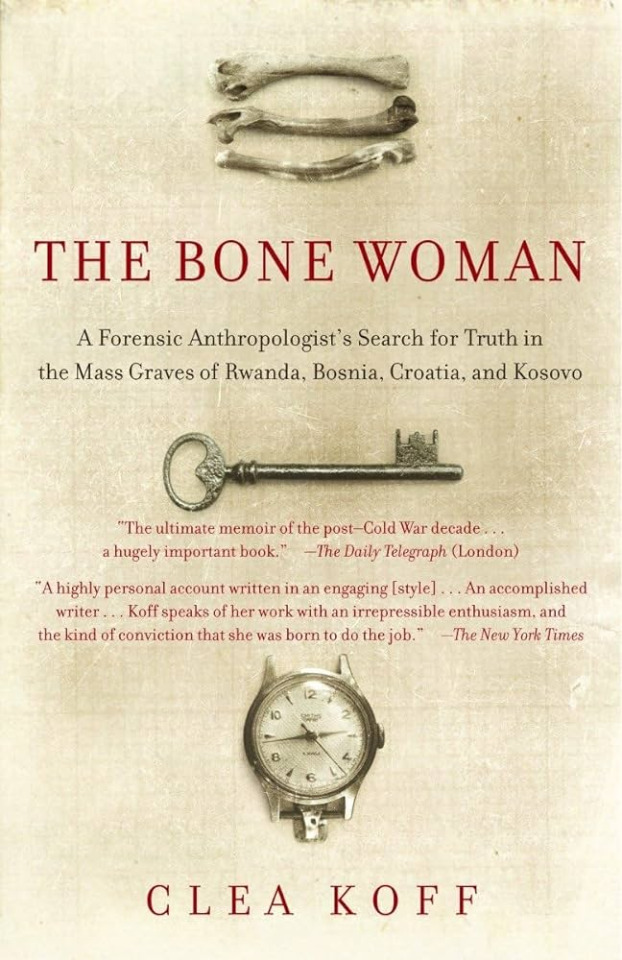

In occasion of the 30th anniversary from the Rwandan genocide I couldn't refrain from presenting you with this book I read a couple of years ago. It's a memoir/report by Clea Koff, a forensic anthropologist, who worked on the mass graves of the most important massacres in recent history: Rwanda, Bosnia, Croatia, Kosovo.
From Penguin Random House Canada:
Published ten years after the genocide in Rwanda, The Bone Woman is a riveting, deeply personal account by a forensic anthropologist sent on seven missions by the UN War Crimes Tribunal. To prosecute charges of genocide and crimes against humanity, the UN needs proof that the bodies found are those of non-combatants. This means answering two questions: who the victims were, and how they were killed. The only people who can answer both these questions are forensic anthropologists. Before being sent to Rwanda in 1996, Clea Koff was a twenty-three-year-old graduate student studying prehistoric skeletons in the safe confines of Berkeley, California. Over the next four years, her gruelling investigation into events that shocked the world transformed her from a wide-eyed student into a soul-weary veteran — and a wise and deeply thoughtful woman. Her unflinching account of those years — what she saw, how it affected her, who went to trial based on evidence she collected — makes for an unforgettable read, alternately riveting, frightening and miraculously hopeful. Readers join Koff as she comes face to face with the human meaning of genocide: exhuming almost five hundred bodies from a single grave in Kibuye, Rwanda; uncovering the wire-bound wrists of Srebrenica massacre victims in Bosnia; disinterring the body of a young man in southwestern Kosovo as his grandfather looks on in silence. As she recounts the fascinating details of her work, the hellish working conditions, the bureaucracy of the UN, and the heartbreak of survivors, Koff imbues her story with an immense sense of hope, humanity and justice.
I also recommend you watch the video and read the articles and posts I shared earlier on my blog to better understand how this horror came to be:
Rwanda: From colonialism to genocide (documentary + article)
Emmanuel Macron's declarations
Some other book recommendations:
[FR] Maria Malagardis, "Avant la nuit"
[FR] Dorcy Rugamba, "Hewa Rwanda: Lettre aux absents"
Fiston Mudacumura, "Born Hutsi: My Imbroglio"
Thank you for your attention.
#my posts#book recommendations#Clea Koff#Rwanda#Rwandan genocide#20th century#1994#30th anniversary#The Bone Woman#long post#links#colonialism#19th century#German history#Belgian history#Germany#Belgium#Maria Malagardis#Dorcy Rugamba#Fiston Mudacumura#littérature#Frenchblr#women in history#women in science#women in literature
16 notes
·
View notes
Text
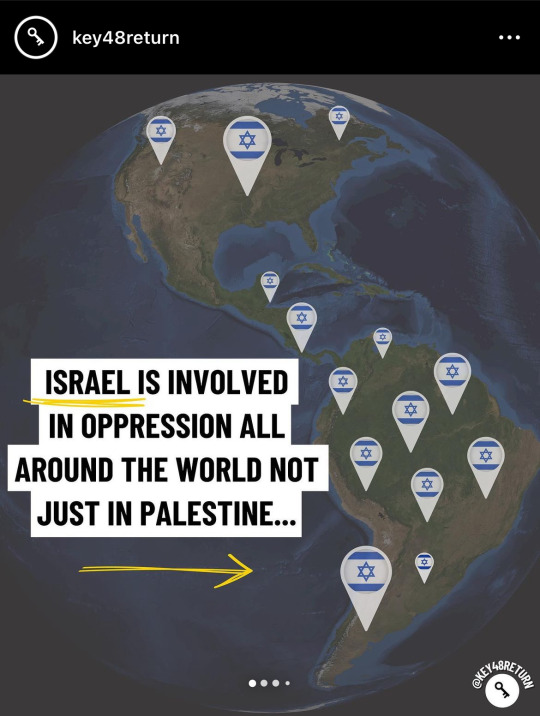
ID 1: Screenshot of a post by @/key48return on Instagram. Background is of a globe with pinpoints of the israeli flag all over North and South America. Title reads in all caps, “israel is involved in oppression all over the world not just in Palestine…” A yellow arrow points right underneath the title. End ID
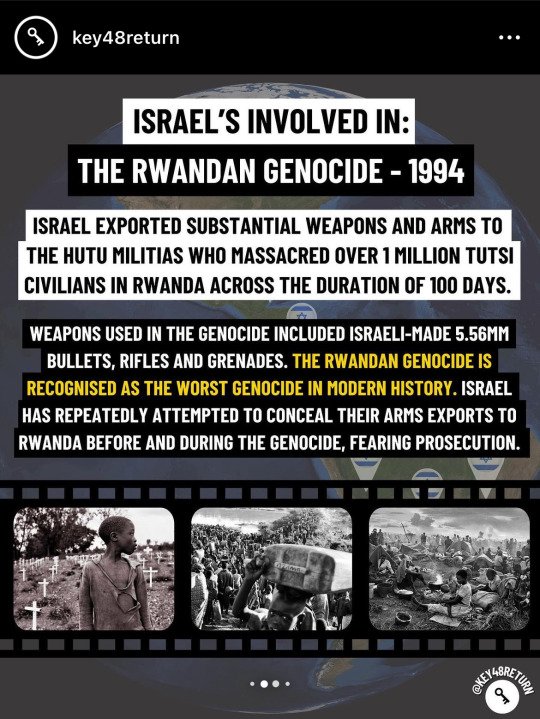
ID 2: In all caps, “ISRAEL'S INVOLVED IN:
THE RWANDAN GENOCIDE - 1994
ISRAEL EXPORTED SUBSTANTIAL WEAPONS AND ARMS TO THE HUTU MILITIAS WHO MASSACRED OVER 1 MILLION TUTSI CIVILIANS IN RWANDA ACROSS THE DURATION OF 100 DAYS.
WEAPONS USED IN THE GENOCIDE INCLUDED ISRAELI-MADE 5.56MM BULLETS, RIFLES AND GRENADES. THE RWANDAN GENOCIDE IS RECOGNISED AS THE WORST GENOCIDE IN MODERN HISTORY. ISRAEL HAS REPEATEDLY ATTEMPTED TO CONCEAL THEIR ARMS EXPORTS TO RWANDA BEFORE AND DURING THE GENOCIDE, FEARING PROSECUTION.”
Black and white photos below are shown of various Rwandan children in graveyards or in makeshift tents just trying to get by. End ID.
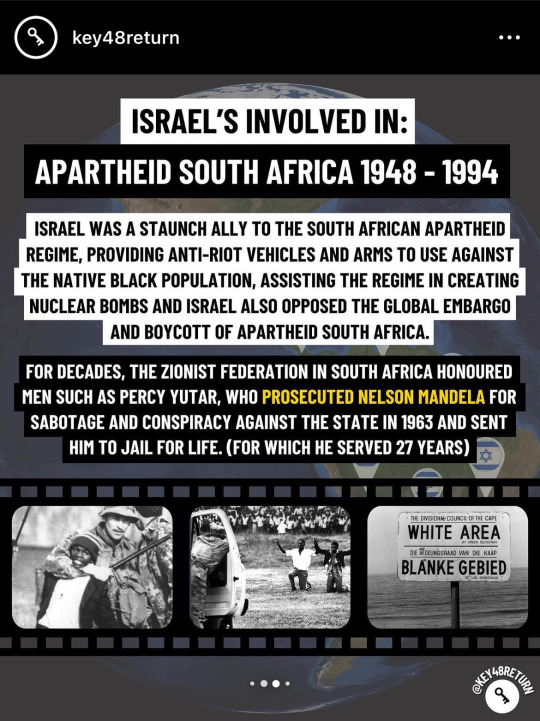
ID 3: In all caps, “ISRAEL'S INVOLVED IN:
APARTHEID SOUTH AFRICA 1948 - 1994
ISRAEL WAS A STAUNCH ALLY TO THE SOUTH AFRICAN APARTHEID REGIME, PROVIDING ANTI-RIOT VEHICLES AND ARMS TO USE AGAINST THE NATIVE BLACK POPULATION, ASSISTING THE REGIME IN CREATING NUCLEAR BOMBS AND ISRAEL ALSO OPPOSED THE GLOBAL EMBARGO AND BOYCOTT OF APARTHEID SOUTH AFRICA.
FOR DECADES, THE ZIONIST FEDERATION IN SOUTH AFRICA HONOURED MEN SUCH AS PERCY YUTAR, WHO PROSECUTED NELSON MANDELA FOR SABOTAGE AND CONSPIRACY AGAINST THE STATE IN 1963 AND SENT HIM TO JAIL FOR LIFE. (FOR WHICH HE SERVED 27 YEARS)”
Black and white photos below showcase a Black man being held in a chokehold by a white man, two Black people on their knees and hands up trying not to get shot, and a sign that reads in english and afrikaans “white area.” End ID.
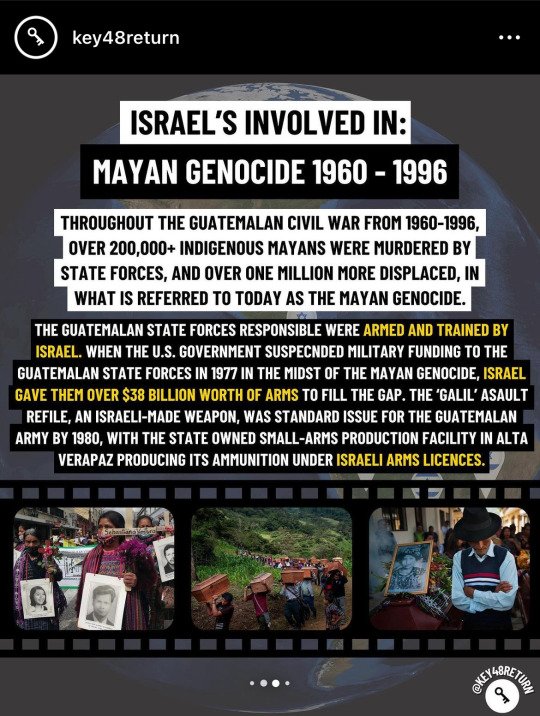
ID 4: In all caps, “ISRAEL'S INVOLVED IN:
MAYAN GENOCIDE 1960 - 1996
THROUGHOUT THE GUATEMALAN CIVIL WAR FROM 1960-1996, OVER 200,000+ INDIGENOUS MAYANS WERE MURDERED BY STATE FORCES, AND OVER ONE MILLION MORE DISPLACED, IN WHAT IS REFERRED TO TODAY AS THE MAYAN GENOCIDE.
THE GUATEMALAN STATE FORCES RESPONSIBLE WERE ARMED AND TRAINED BY ISRAEL. WHEN THE U.S. GOVERNMENT SUSPENDED MILITARY FUNDING TO THE GUATEMALAN STATE FORCES IN 1977 IN THE MIDST OF THE MAYAN GENOCIDE, ISRAEL GAVE THEM OVER $38 BILLION WORTH OF ARMS TO FILL THE GAP. THE 'GALIL' ASAULT RIFLE, AN ISRAELI-MADE WEAPON, WAS STANDARD ISSUE FOR THE GUATEMALAN ARMY BY 1980, WITH THE STATE OWNED SMALL-ARMS PRODUCTION FACILITY IN ALTA VERAPAZ PRODUCING ITS AMMUNITION UNDER ISRAELI ARMS LICENCES.”
Below are multiple in-color photos of Mayan families mourning, one photo in particular which shows indigenous Mayans carrying a seemingly endless line of coffins off into the distance. End ID.
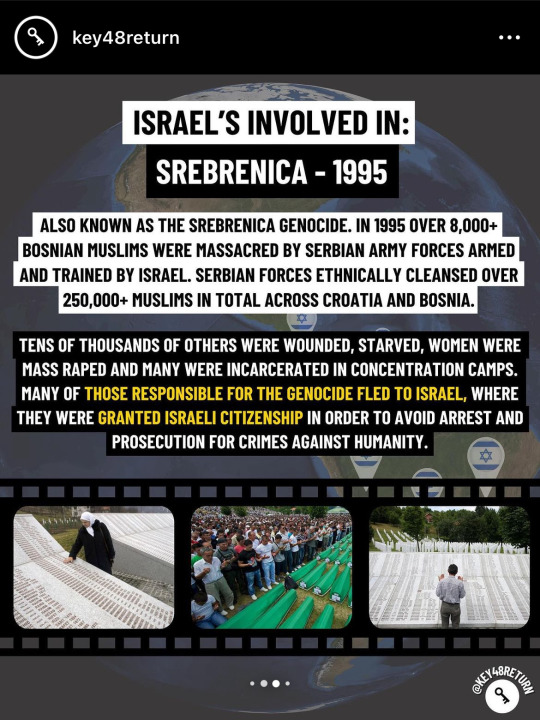
ID 5: In all caps, “ISRAEL'S INVOLVED IN:
SREBRENICA - 1995
ALSO KNOWN AS THE SREBRENICA GENOCIDE. IN 1995 OVER 8,000+ BOSNIAN MUSLIMS WERE MASSACRED BY SERBIAN ARMY FORCES ARMED AND TRAINED BY ISRAEL. SERBIAN FORCES ETHNICALLY CLEANSED OVER 250,000+ MUSLIMS IN TOTAL ACROSS CROATIA AND BOSNIA.
TENS OF THOUSANDS OF OTHERS WERE WOUNDED, STARVED, WOMEN WERE MASS RAPED AND MANY WERE INCARCERATED IN CONCENTRATION CAMPS. MANY OF THOSE RESPONSIBLE FOR THE GENOCIDE FLED TO ISRAEL, WHERE THEY WERE GRANTED ISRAELI CITIZENSHIP IN ORDER TO AVOID ARREST AND PROSECUTION FOR CRIMES AGAINST HUMANITY.”
Once again, the in-color photos below show various peoples mourning. Two of the photos specifically show people reaching their hands out over extremely long lists of just names of people who have died. End ID.

ID 6: In all caps, “ISRAEL'S INVOLVED IN:
TRAINING U.S. POLICE
SINCE 1990, HUNDREDS OF AMERICAN POLICE OFFICERS, INCLUDING AGENTS FROM THE FBI, CIA AND IMMIGRATION AND CUSTOMS ENFORCEMENT (ICE), HAVE EITHER BEEN SENT TO ISRAEL THROUGH POLICE TRAINING EXCHANGES, OR ATTENDED SUMMITS WITHIN THE U.S. THAT WERE SPONSORED BY ISRAELI LOBBY ORGANISATIONS.
THE KNEE-TO-NECK 'RESTRAINT' THAT DEREK CHAUVIN MURDERED GEORGE FLOYD WITH, IS OFTEN USED BY ISRAELI POLICE AND SOLIDERS AGAINST PALESTINIANS.
BLACK LIVES MATTER.”
Photos below are in-color and show various B.L.M. protests. End ID.
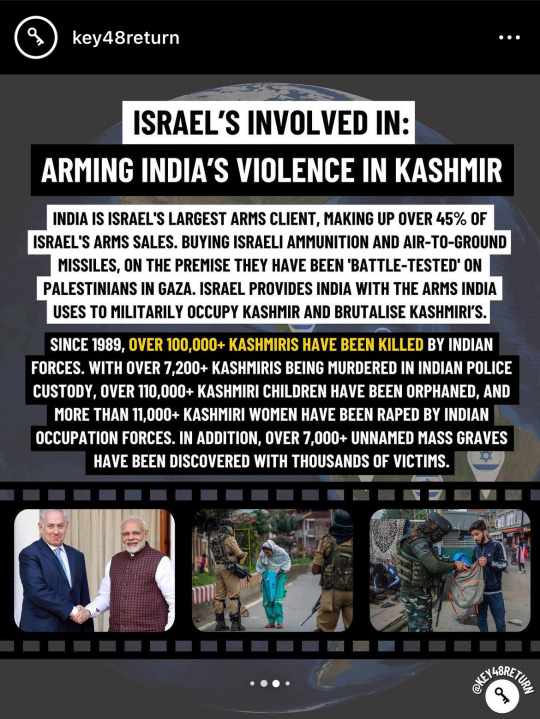
ID 7: In all caps, “ISRAEL'S INVOLVED IN:
ARMING INDIA'S VIOLENCE IN KASHMIR
INDIA IS ISRAEL'S LARGEST ARMS CLIENT, MAKING UP OVER 45% OF ISRAEL'S ARMS SALES. BUYING ISRAELI AMMUNITION AND AIR-TO-GROUND MISSILES, ON THE PREMISE THEY HAVE BEEN 'BATTLE-TESTED' ON PALESTINIANS IN GAZA. ISRAEL PROVIDES INDIA WITH THE ARMS INDIA USES TO MILITARILY OCCUPY KASHMIR AND BRUTALISE KASHMIRI'S.
SINCE 1989, OVER 100,000+ KASHMIRIS HAVE BEEN KILLED BY INDIAN FORCES. WITH OVER 7,200+ KASHMIRIS BEING MURDERED IN INDIAN POLICE CUSTODY, OVER 110,000+ KASHMIRI CHILDREN HAVE BEEN ORPHANED, AND MORE THAN 11,000+ KASHMIRI WOMEN HAVE BEEN RAPED BY INDIAN OCCUPATION FORCES. IN ADDITION, OVER 7,000+ UNNAMED MASS GRAVES HAVE BEEN DISCOVERED WITH THOUSANDS OF VICTIMS.”
The photos below show israel and india’s leaders shaking hands and various armed indian soldiers stopping Kashmiris for unnecessary checks. End ID.
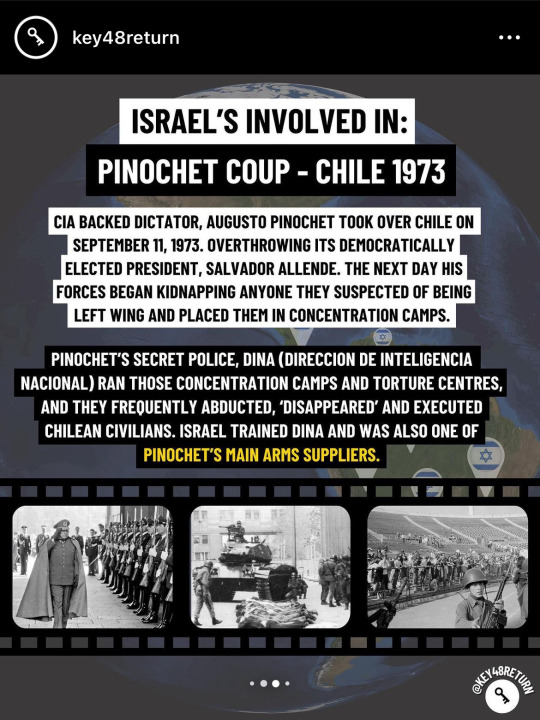
ID 8: In all caps, “ISRAEL'S INVOLVED IN:
PINOCHET COUP - CHILE 1973
CIA BACKED DICTATOR, AUGUSTO PINOCHET TOOK OVER CHILE ON SEPTEMBER 11, 1973. OVERTHROWING ITS DEMOCRATICALLY ELECTED PRESIDENT, SALVADOR ALLENDE. THE NEXT DAY HIS FORCES BEGAN KIDNAPPING ANYONE THEY SUSPECTED OF BEING LEFT WING AND PLACED THEM IN CONCENTRATION CAMPS.
PINOCHET'S SECRET POLICE, DINA (DIRECCION DE INTELIGENCIA NACIONAL) RAN THOSE CONCENTRATION CAMPS AND TORTURE CENTRES, AND THEY FREQUENTLY ABDUCTED, 'DISAPPEARED' AND EXECUTED CHILEAN CIVILIANS. ISRAEL TRAINED DINA AND WAS ALSO ONE OF PINOCHET'S MAIN ARMS SUPPLIERS.”
Black and white photos below showcase various scenes of armed DINA officers, with one photo in particular showing them in a tank over bodies on the ground, presumably dead. End ID.
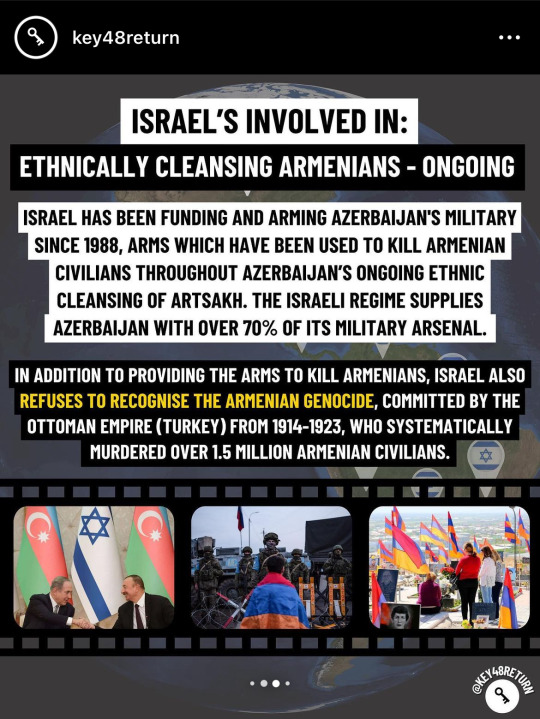
ID 9: In all caps, “ISRAEL'S INVOLVED IN:
ETHNICALLY CLEANSING ARMENIANS - ONGOING
ISRAEL HAS BEEN FUNDING AND ARMING AZERBAIJAN'S MILITARY SINCE 1988, ARMS WHICH HAVE BEEN USED TO KILL ARMENIAN CIVILIANS THROUGHOUT AZERBAIJAN'S ONGOING ETHNIC CLEANSING OF ARTSAKH. THE ISRAELI REGIME SUPPLIES AZERBAIJAN WITH OVER 70% OF ITS MILITARY ARSENAL.
IN ADDITION TO PROVIDING THE ARMS TO KILL ARMENIANS, ISRAEL ALSO REFUSES TO RECOGNISE THE ARMENIAN GENOCIDE, COMMITTED BY THE OTTOMAN EMPIRE (TURKEY) FROM 1914-1923, WHO SYSTEMATICALLY MURDERED OVER 1.5 MILLION ARMENIAN CIVILIANS.”
Photos below show israel and azerbaijan’s leaders shaking hands, azerbaijan’s soldiers menacingly standing in front of someone wrapped in an Armenian flag, and Armenians mourning over a shrine with their flags all around them. End ID.

ID 10: In all caps, “THE PALESTINIAN STRUGGLE FOR FREEDOM IS CONNECTED TO STRUGGLES ALL AROUND THE WORLD.
BECAUSE OPPRESSORS LIKE ISRAEL ARE NOT ONLY UPHOLDING OPPRESSION AGAINST ONE POPULATION, ITS ALWAYS INTERCONNECTED TO OPPRESSING MANY MORE.
FREE PALESTINE.” No photos at the bottom of this slide. End ID.
#reaux speaks#oppression#genocide#ethnic cleansing#apartheid#israel#palestine#free palestine#black lives matter#history#rwanda#africa#south africa#nelson mandela#mayans#guatemala#srebrenica#muslim#police brutality#kashmir#india#narendra modi#benjamin netanyahu#augusto pinochet#chile#armenia#artsakh#azerbaijan#bosnia#serbia
3K notes
·
View notes
Text
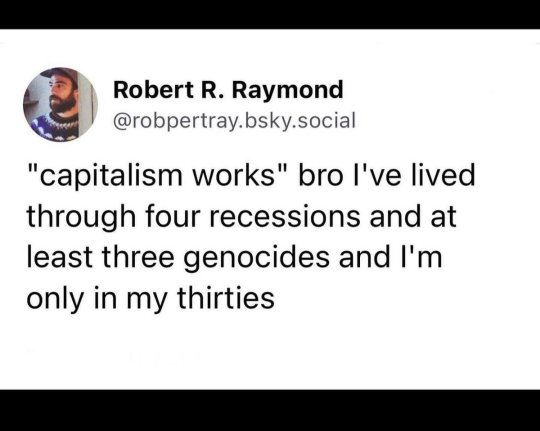
Saw this and I actually wanted to add some actual details, in case people didn't know/weren't curious.
US Specific Recessions:
Recession of 1990 and 1991
2000 to 2001 Recession
The Great Recession, from 2007 to 2009 (this does not include the recovery, which took years and arguably never really happened)
The COVID Recession
Genocides:
Rohingya (2016 and ongoing)
Iraqi Turkmen (2014-2017)
Yazidis Genocide (2014-2019)
Darfur (2003 and ongoing)
Congolese (2002-2003)
Hutus (1996-1997)
Rwanda (1994)
Bosnia (1992-1995)
I'm presuming we can all agree he was also referring to Ghaza right now
So yeah. 9 Genocides and 4 major recessions since 1990. If he was born in 1985 there are 3 more genocides (Anfal, Gukurahundi, and Isaaq).
#genocide#recession#capitalism#politics#original content#gaza#darfur#rohingya#covid#bosnia#rwanda#darfud#yazidis
406 notes
·
View notes
Text

Happy Feast Day
Our Lady of Kibeho
Feast day: November 28
Our Lady of Kibeho is the name given to Marian apparitions concerning several adolescents, in the 1980s in Kibeho, south-western Rwanda. The apparitions communicated various messages to the schoolchildren, including an apocalyptic vision of Rwanda descending into violence and hatred, possibly foretelling the 1994 Rwandan Genocide. Our Lady of Kibeho became the first and only Vatican-approved Marian site in Africa.
Prints, plaques & holy cards available for purchase. (website)
55 notes
·
View notes
Text
it is suspected that a genocide has occurred in darfur and is ongoing in south sudan. the situation is being compared to rwanda in 1994. black activists have been saying this. i am curious if the genocide in palestine attracts more, in fact pretty much all, attention from the west because it's a narrative in which the west is complicit and can actively center themselves as activists. hard to care about a genocide if you don't feel guilty by association i guess.
#i am as complicit as anyone for not talking about this but i literally have only the vaguest idea of the severity unless i actually seek out#information on my own- there is no network of awareness like there is for ukraine and palestine that can be relied upon to give live update#and im sure its the same for many people: but that raises the question of why activists are not also focusing on this#(and i do NOT mean palestinian activists either: i mean western and mostly white activists)
145 notes
·
View notes
Text
by Peter Baum
Since the third but most recent creation of the Jewish State of Israel in 1948 and the various conflicts she has faced since, the total number of deaths including those since October 7, has been no more than 200,000 inclusive of both sides and of various nationalities – Lebanese, Egyptian, Syrian , Jordanian , Israelis and Arab Palestinians. Averaging circa 2500 deaths per annum with a heavily swayed death total to the Arab Palestinian population.
Statistics only being identified by the Hamas Authorities state over 40,000 Arab Palestinians killed but this must include Hamas operatives, estimated to be nearly 20,000 perhaps more. If one compares this to the deaths of civilians during a similar period in Nigeria, Afghanistan, Burkina Faso, Mali, Somalia, Yemen, Syria, Pakistan, Iraq, Ethiopia, Eritrea, Mexico and Columbia then by equivalent statistical data these conflicts were also genocides – but not according to mainstream media, political commentators or the United Nations. Only the Palestinians apparently are victims of genocide. The only contemporary wearers of the Crown of Genocide.
So, let’s revert to the DRC and attempt to make sense of global conflicts, their victims and the role of our media and political leaders. By any intelligent research it is a truth that in less than thirty years over six million indigenous, black, African Congolese have been killed in internal conflict sometimes extending to the countries directly bordering the DRC. It is also an undeniable fact that a multiple of three to four times that number killed have been displaced from their homelands. Given the lack of knowledge about the country itself I would wager there is even less knowledge relating to the armed militias, groups or interested parties participating in this human tragedy. In all truth who of you have heard or read about the FARDC (Congolese Army) or the M23 rebel militia?
How can it possibly be in this day and age that six million black Africans can be slaughtered, and mainstream media totally ignores these tragedies. It is not only in the DRC a true genocide occurred. In Rwanda in 1994 nearly one million black Africans were butchered. And if I asked who butchered who, I would wager the majority don’t know the answer. Apart from a lack of knowledge of the two tribal protagonists, Hutus and Tutsis, I would wager that very few know who the perpetrators were and who were the victims. I’m not telling – dyor as we scribe lazily use such terminology.
So, two true genocides in Africa go unreported by our mainstream media. The six hundred thousand killed in Syria or the 250,000 deaths in Yemen have also gone similarly unnoticed. In Sudan, Eritrea and Libya the total death toll in the last five years is one million plus. But again, no media coverage.
And with lack of reporting there will be no protests, no outrage, no boycotts, no attacks on ordinary folk by activists, no UN sanctions, no political management.
So, four genocides occur but no outrage and a non-genocide receives global attention and political activism often bordering on criminality leading to the deaths of innocents. How can this be? I will tell you.
The global order which includes the Theatre of the Absurd – the United Nations, together with global mainstream media and an ever-increasing Muslim population with numerous countries subservient to that religion have adopted a truly successful agenda. Within that agenda money paid to corrupt African politicians has played a crucial role and has garnered support from the political left who are rabid anti-Semites and thus the saturation negative reporting on Israel as the aggressor and the Palestinian as victims. The fact that the Palestinians adhere to Charters demanding Jew extermination has been for decades conveniently ignored.
Atrocities in Africa are purposely overlooked and total concentration is beamed on Israel a state no bigger than New Jersey in the USA. Disproportionate, saturation negative reporting on Israel by mainstream media take total precedence above all other global conflicts.
39 notes
·
View notes
Text
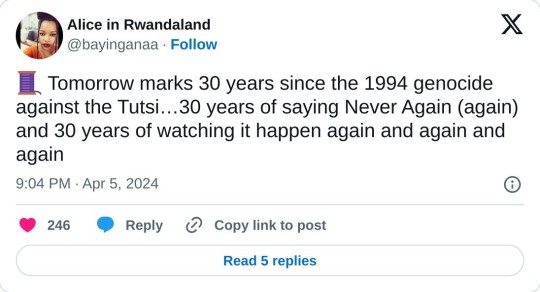
It weighs on me a lot heavier this year because I’m away from home but also because I, like many, have spent the past 6 months witnessing Isra*l’s intensification of its genocide against the Palestinian people in real time.
My heart is shattered and its pieces are in Rwanda with my people and in particular with my family as we remember the senseless killings of our loved ones (of my grandparents, aunts, uncles, cousins) and the many other horrors that were perpetrated as the world watched.
In Palestine, in Sudan, in Congo, in Haiti, in too many places where people continue to witness the murders of their loved ones while fighting for their lives against impossible brutality…as the world watches.
Here on this land with First Nations people who also continue to struggle against a settler colonial state that seeks their annihilation. They are everywhere the lives of people continue to be sacrificed at the altar of power and profit.
I can barely put in words what I have felt watching institutions provide platform after platform to the Isra*li embassy in Rwanda to continue to legitimize the genocide their country is committing in front of all of our eyes
I am especially revolted by all of this in the context of the Isr*eli sale of arms to the genocidal government of 1994 while it was under international embargo…and the continued refusal to unseal the documents pertaining to this
But even on the darkest days I HAVE to believe that we can and should do everything in our power to bring forth a world in which Never Again is a reality everywhere. In which we refuse to allow this to happen to ANYONE ever again because if not then IDK what the point is
May the memories of all of our loved ones be our strength. Tuzahora tubibuka! Palestine will be free! This world will all one day be free!
65 notes
·
View notes
Text
Macron said that France could have stopped the genocide in Rwanda in 1994, especially with the help of its African allies and its Western allies as well. But he then added that “France did not have the will/desire to do it”.
Apparently he is planning a speech on that specific subject on Sunday.
Dude needs a whole speech and so many words to say that France was an accomplice and active participant in the genocide in Rwanda? Like having the means and ability to stop a genocide but refusing to or “not having the will/desire” to stop a freaking genocide is called being a fucking accomplice.
#France#Rwanda genocide#genocide#Tutsi genocide#macron#politics#France being on the side of the genocidal maniacs as usual#it’s a French tradition at this point
59 notes
·
View notes
Text
A lot of folks, especially in the Jewish community, have mixed feelings about Harris picking Walz as her VP over Shapiro. Some wanted Shapiro for the Jewish representation, especially a Jew who is Zionist and yet decries Netanyahu and expresses the desire for peace that so many of us have. Some worried that having two Jews in the White House would provoke yet more antisemitism and possibly even sink the ticket, given the massive surge in leftist antisemitism recently.
Many of us were frustrated and angered by seeing leftists campaign for Walz being the pick over Shapiro more or less entirely because Shapiro is Jewish—and felt a sense of dismay that perhaps Harris had caved to the antisemites.
I'm a Jew but I'm also a Minnesotan. I was glad to see the Walz pick for many reasons unrelated to my Jewish identity or Israel. But I want to also submit that Walz, uniquely among the politicians Harris could have picked, brings something to the table that is desperately important both to the nation more broadly and our community more specifically.
I present as Exhibit A, this archived NYT profile of Walz from back in 2008:
The teacher, Tim Walz, was determined that even in this isolated place, perhaps especially in this isolated place, this county seat of 9,000 that was hours away from any city in any direction, the students should learn how and why a society can descend into mass murder.
...
“The Holocaust is taught too often purely as a historical event, an anomaly, a moment in time,” Mr. Walz said in a recent interview, recalling his approach. “Students understood what had happened and that it was terrible and that the people who did this were monsters. “The problem is,” he continued, “that relieves us of responsibility. Obviously, the mastermind was sociopathic, but on the scale for it to happen, there had to be a lot of people in the country who chose to go down that path. You have to make the intellectual leap to figure out the reasons why.”
My ancestors immigrated to the US around the turn of the century from Mariampol, Lithuania and Luboml, Ukraine. When the Nazis arrived in those towns some 40 years later, the Jews there (many of whom would have been my ancestors' relatives) were massacred not by Nazi soldiers, but by their neighbors, who welcomed the Nazis with open arms. You cannot truly help protect the Jewish community from antisemitism if you don't understand this crucial detail about how the Holocaust happened.
So Mr. Walz took his students [...] and assigned them to study the conditions associated with mass murder. What factors, he asked them to determine, had been present when Germans slaughtered Jews, Turks murdered Armenians, the Khmer Rouge ravaged their Cambodian countrymen?
...
They read about civil war, colonialism and totalitarian ideology. They worked with reference books and scholarly reports, long before conducting research took place instantly online.
...
When the students finished with the past, Mr. Walz gave a final exam of sorts. He listed about a dozen current nations — Yugoslavia, Congo, some former Soviet republics among them — and asked the class as a whole to decide which was at the greatest risk of sliding into genocide. Their answer was: Rwanda. The evidence was the ethnic divide between Hutus and Tutsis, the favoritism toward Tutsis shown by the Belgian colonial regime, and the previous outbreaks of tribal violence. Mr. Walz awarded high marks. The next April, in 1994, Mr. Walz heard news reports of a plane carrying the Rwandan president, Juvenal Habyarimana, being shot down. [...] Mr. Walz’s students, now juniors, saw their prophecy made into flesh and blood.
...
“You have to understand what caused genocide to happen,” Mr. Walz said, with those grim anniversaries in mind. “Or it will happen again.”
Y'all, Tim Walz is not Jewish. He's a white guy who grew up in Nebraska and then lived in one of Minnesota's smaller cities, up until going to Congress and then the Governor's mansion. No, he does not provide us with representation, nor will he ever truly understand what it feels like to be Jewish in America in 2024.
But he gets it. He understands not just academic history but people, and understands that "Never Again" is only feasible if we look at root causes, and strive to nip the factors that lead to genocide in the bud. We have all understood that allyship for Jews is only meaningful if you're here defending us before it gets violent.
Governor Walz represents an opportunity to have someone in the White House, on the national stage, who understands the big picture and the history well enough to actually be able to navigate incredibly complex and painful issues like the Israeli/Palestinian conflict, like the regional conflicts within the Arab world, like the experience of progressive Jews in the US who would have found ourselves ostracized and alienated from increasingly hostile leftist movements. I cannot begin to explain how rare it is to have a politician at this level who also carries an experienced teacher's grasp of both history and empathy.
Maybe Josh Shapiro would have also brought that. But honestly, I'm not so sure. Walz may not be Jewish. But I think we're going to find that he'll be an ally, and a deeply learned and wise one at that. And I think we really need that right now.
25 notes
·
View notes
Note
So it's ok for israel to commit atrocities and genocides just bc other regimes are also committing war crimes? Please be serious
That’s not my argument. Never accept the ‘it could be worse’ argument since it doesn’t help you trying to make things better.
My point is that young people in the west, in particular, have been sheltered from the realities of war and how horrible it is. This has made you vulnerable to propaganda that you repeat above - that this war is full of atrocities and genocide. You can only think that if by being so unaware about what those things look like. There’s also this almost naive belief that - since the world is a fair and just place - that things you ignore can’t be genocide because no one is making a fuss about it. And if someone is making a fuss, then it must be serious. But that’s not true at all. In fact, there are forces in the world that would very much like you to ignore their genocides and focus elsewhere.
The harsh reality is that It’s extraordinarily easy to kill large numbers of people, especially by surprise and especially in small communities.
Let’s reverse the scenario, oct 7th was genocidal in intent, clearly the orders were to kill as many people as possible and kidnap as many as they could transport. In 24 hours, 3000 men killed approx 900 civilians and kidnapped another 200+. Then a military response finally mobilized and resistance started, resulting in more Israeli military deaths - around 300- and the deaths of about 2000 of Hamas fighters as they were overwhelmed.
Imagine israel attacking without warning, going house to house and just killing everyone in sight. Let’s restrict this to small arms, motorcycles and everyone wears civilian clothes or are dressed as Hamas fighters to sow confusion.
But Israel can send 300,000 fighters not 3000. In the first 24 hours the death toll would be near 90000 killed before resistance was mobilized, assuming it even tried. The entire population would be dead in 26 days using nothing but small arms fire.
In Rwanda in 1994 800,000 people were killed over 3 months with machetes and a few machine guns. The rolling Sudan genocide between 2003-2005 killed 200,000 people, 300,000 raped and 2 million people displaced. World war 2 lasted 5 years and 6 million people were exterminated - plus a peer to peer war was happening at the same time that cost another 75 million lives. The word genocide was invented to describe what happened to Jews in Europe, but systematic killing has been part of human societies forever. We just have more efficient weapons now.
The world is a bad place anon, and you should never take safety and civilization for granted. This is the larger reality I want you to see. you have to realistically look at the numbers and realize that if Israel wanted to kill everyone in Gaza it would have happened by now.
But this misinformation continues to spread, even as the UN finally admits the reports of deaths in Gaza of women and children have been exaggerated, and that in fact many of the dead are Hamas fighters. I won’t go as far as to say no atrocity has been committed by Israel during this campaign - all reports should all be investigated - but I look at the numbers and see Israel at least trying to meet a military standard of conduct against an enemy that would commit genocide if they just had more time.
26 notes
·
View notes
Text

Our Lady of Kibeho
Feast day: November 28
Our Lady of Kibeho is the name given to Marian apparitions concerning several adolescents, in the 1980s in Kibeho, south-western Rwanda. The apparitions communicated various messages to the schoolchildren, including an apocalyptic vision of Rwanda descending into violence and hatred, possibly foretelling the 1994 Rwandan Genocide. Our Lady of Kibeho became the first and only Vatican-approved Marian site in Africa.
Prints, plaques & holy cards available for purchase here: (website)
60 notes
·
View notes
Text

What is happening in Congo ?
I. INTRODUCTION
Today, it’s been 64 years since the Democratic Republic of Congo is officially an independent country. Yet, Congo, a country that I cherish is going through multiple crises, and particularly a genocide since long time ago.
If you didn’t know it yet, this genocide is orchestrated by Rwanda and Uganda’s governments and militaries, but also congolese militias, composed of rebels named the M23 but funded and sold weapons to notably by European countries. This is happening since near 30 years.
I feel compelled to talk about it since what is happening isn’t talked about enough in mainstream medias. Yes, it is true these last months a lot of people have learned about it and even celebrities expressed their support for the inhabitants of Kivu (the region targeted by the genocide), but fewer people really know what it is about and how destructive it is.
First, how did it happen ?
If you have to know one thing it is certainly that since D.R.C.’s liberation from the kingdom of Belgium the 30th of June 1960, after Lumumba fought for his people’s freedom, he became the prime minister, then was betrayed by his comrades, and finally murdered, since these times, Congolese people almost always been living in between civilians crises, wars, and genocide.

Lumumba before his execution. ⬆️
To simplify, in 1971, Mobutu succeeded a coup d'état and the Democratic Republic of Congo officially became ‘Zaïre’ under Mobutu’s dictatorship. However, Mobutu was kicked out after the first war of D.R.C., opposing the Zaïre and Allies led by Mobutu, and AFLD (The Alliance of Democratic Forces for the Liberation of Congo) led by Laurent-Désiré Kabila and his Allies including Uganda and Rwanda.
To understand the origins of the congolese genocide, we have to acknowledge what happened in Rwanda later after the events I just spoke about. Between the 7th April of 1994 and 15th July of 1994, which, in the time span of 3 months, only 3 months and 10 days, 800,000 millions of civilians died. Primarily members of the minority ethnic group Tutsis but also moderate Hutus and Twa were killed by armed Hutu militias. This genocide was supported by Rwanda’s government and still in these days is considered as the bloodiest one in a short time span.
« Although the origins of the mass killing were initially blamed on the assassination of Rwandan President Juvenal Habyarimana (whom the Hutu falsely claimed had been murdered by Tutsis), the conflict’s actual origins can be traced to decades prior.
During Belgian rule, the colonial government instituted a separation of Hutus and Tutsis, favoring the Tutsis and placing them in greater leadership roles within the country. The systematic divide led to tremendous resentment in the years that followed, culminating in unresolved tension that provoked the Hutus to steal, rape, and kill for basic human rights. » source : What Was the Biggest Genocide in Human History
The connection with D.R.C. ?
The fact over 2,000,000 Rwandan fled the country during or immediately after the genocide, in the people who emigrated were members of the Hutu ethnicity, some of them being genociders. They took refuge in Nord-Kivu, in D.R.C. , at the border of Rwanda. They were scared because at that time Tutsi gained the power over the country and Hutus feared they would take their revenge, that is why they left Rwanda.

Nord-Kivu on a map. ⬆️
« The Congo-Kinshasa government agreed to repatriate Hutus involved in the 1994 Rwandan genocide if Rwanda agreed to remove its forces from the Kivus, the land Rwanda has controlled since 1998.
Furthermore, the resource-rich nature of the DRC also makes the area prone to conflict, further placing the Hutus at risk. One can not be optimistic, therefore, in the near-term prospects of DRC Hutus to live in relative peace and security. » Assessment for Hutus in the Dem. Rep. of the Congo
Then, happened the second war of D.R.C. from 1998 to 2003, which killed from 183,000 to 4 or 4,5 millions of people due to starvation and illnesses.
« According to the Kigali government, the Hutu refugee camps formed after the genocide fell under the control of the Interahamwe Hutu militias, to which many genocides belonged, and helped by the Hutu members of the former Rwandan army, they planned to regain power by force.
According to other actors, the presence of Rwandan troops in the DRC was motivated by the project to plunder mining resources in the region. This is confirmed by a UN report requested by the Security Council which indicates, from the interviews conducted by the expert group, that the Rwandan army remained mainly to obtain goods. The report also describes the strategy of the armed groups present in the area to plunder resources from the subsoil for their benefit, in a context of massacres and rape. » source : Deuxième guerre du Congo

Players of the DRC team, during semi-final of the CAN. ⬆️
II. GENOCIDE
As I said it before, genocide been going on for 26-27 years to be exact. Kivu is mainly targeted for its ressources of Coltan, Cobalt, Diamonds and Gold since the M23 and Rwandan military took control of the mines we named "blood mines" because of the deaths they cause. It had been estimated more than 40,000 children are forced to work in mines in Nord-Kivu.
Coltan and Cobalt are both materials used in computers, phones, most electronics devices in general. Both have in common to be materials mined in Nord-Kivu in unethical ways, it’s literally slavery, workers aren’t paid and are forced to work for the militias and Rwanda. Which later on sell these ressources to the whole world and steal Congolese’s ressources. Yet, talking about natural ressources D.R.C. is one of, if not the first, richest country in the whole world. And if Nord-Kivu is so coveted by entreprises AND countries in commercial interests, it’s because this place holds 70% of world’s Cobalt, as for Coltan it’s about 60%. That is also why medias and other countries’ presidents are silent. They know that if they speak up, they will lose partnerships with Rwanda, Uganda and rebels… when you grasp that fact, you are able to understand why violation of human rights, war crimes, child work, sexual crimes, literally slavery is condoned by the whole world. You can finally understand why the world try to silence congolese people : it’s easier to act as if their struggles didn’t exist and exploit them rather than helping them out, that is how cruel the world is.
Let’s not forget about rebels and soldiers who actively terrorize inhabitants, steal them, torture them for fun and influct painful deaths to them. They train children and give them weapons to help them, children, they don’t even know better! Women, children and men are trying to escape their own villages in the Northeast region of D.R.C. to go somewhere else. Millions of displaced people are in makeshift displacement camps, particularly in Goma. Around 600,000 congolese can be found in there, living in unsanitary conditions and earning money mainly through donations and local organizations.
The 3rd of May, at least five rockets exploded in the southwest of the capital of North Kivu (Goma), killing at least 18 people, 32 were injured, including 27 seriously, most of them were women and children. Congolese people struggle to escape these places, struggle to get access to food, struggle to access water and fill their vital needs since mainly militias of rebels and Rwandan soldiers run the zones with weapons and threaten to kill, kidnap, torture and rape anyone who wouldn’t listen to their orders or do something that displease them.
III. SEXUAL VIOLENCES
(TW : that can be very disturbing or triggering for some people to read this, as said in the title, I’m going to talk about sexual assaults, rape and a slight mention of necrophilia(?).)
Let’s not forget about the sexual violence who occur in Nord-Kivu, like in every wars and genocides, soldiers and rebels take advantage of vulnerable situations and poverty to rape women. Women and girls are coerced into doing sex work to ensure their income, buy food and shelters from the same rebels who abuse them. We estimated 48 women get raped by HOURS (source). During two weeks of April 2011, more than 670 victims (more like 1152) of sexual violence were taken care of in the East of D.R.C.
« The vast majority of victims are women and more than half of them say they were attacked by armed men. This happens most of the time "during their travels outside the sites of displaced persons, in search of firewood and food," says the medical organization. » source : RDC autour de Goma, "48 victimes de violences sexuelles par jour"
For feminist organizations, these are feminicides, nothing else other than that. Women and children are especially targeted. White feminists would never talk about what happen to congolese women daily, nor palestinians women. We want women to be free, the violence they go through is not a war weapon that should be used. Wars shouldn’t happen at all. They shouldn’t feel unsafe and dehumanized when they’re going through hardships in their own countries, they shouldn’t feel like they are left out and damned to go through this without any support.
« Most attacks are related to living conditions in the camps. Displaced women find themselves without money, without resources, they are forced to go into the bush to find something to eat or earn a small income » deplores Daddy Ngeve, a midwife, doctors Without Borders.
« There are girls, some of whom are minors, who work in houses of tolerance. They receive between 500 and 2 000 francs [17 to 67 euro cents - editor’s note], » alarms Yvette Shakira, a lawyer at Dynamique des femmes juristes (DFJ), an organization committed to the protection of women.
A lot of congolese women see sex work as their only way out from extreme poverty and I would even say death. They see prostitution as their only way to pay food, water, get access to the most basic healthcare, shelters for themselves, their children and their families. They often get STDs like HIV from lack of protections, serious health issues and deaths through rapes…
What is even sadder is that these women are rejected by their own family, which comfort them into keeping the silence and not telling their relatives about what happened to them.
« "In 9/10 cases, the husband leaves his wife and leaves her in charge of the children. This pushes women to hide the rapes they have suffered", admits Yvette Shakira. "If it happens to his mother, his sister, the man defends them, if it happens to his daughter he takes the lead and asks for justice, but when it happens to his wife, he denies her instead of protecting her." »
source : RDC : à l’ombre du conflit, les femmes en proie à une hausse des viols.

Manyotisi, 32, holds her 6-month-old son, Merveil. He was conceived during a group rape while she was looking for food. She already has two children, but decided to keep Merveil. “He is innocent. I love him,” she said. ⬆️
« In North Kivu, 76% of the victims received by MSF were raped by armed men, the others having been assaulted by civilians. » source : RDC : à l’ombre du conflit, les femmes en proie à une hausse des viols
youtube
Testimony of Fatouma, a victim of rape as a weapon of war in the DRC (in French without English subtitles) ⬆️

translation : "They forced me to rape my mother’s c0rpse, to eat her flesh in the presence of my children." - Desiré Goyabaki, M23 survivor. ⬆️
IV. HOW TO HELP ?
If you want to help Congo, first, being aware, as I said, that Coltan and Cobalt are both materials used for electronics devices is a good start. I know in such a society it’s impossible to get rid of them, but if you are ready to change something - at least in your own habits to reduce the consequences - then there’s advices :
- you could stop buying VAPES, those are bad for health anyway and, on top of that, requires Coltan, which is mined by children. To me, that doesn’t worth buying e-cigarettes, even less at humans lives cost.
- avoid electronic cars, it also requires cobalt and on top of that those cars’ batteries are as bad for environment as average cars, except it does pollute in another way.
- for computers, phones, TVs etc. try to keep them as long as you can. It will save you money and you don’t need the newest phones or the newest electronics devices. If yours work fine, then keep them and you will be able to pay yourself other things instead. Refurbished devices are also a really good idea to save money AND be able to buy new things.
- Make donations if you can and if you got enough money. Obviously, if you struggle for your own needs, it’s only fair to privilege your own life. But if you have some money here and then and are sure about where the money is going to, then you can do this.
- Finally, spread awareness. I’m not telling you to give all the details of D.R.C. history to your relatives. But if you have some friends, siblings, parents, talk to them about what happen. The more people know, the more people are invested. That’s a small thing, but it could change everything.
V. CONCLUSION
I am feeling powerless when I see how live congolese people in Kivu, but most of the matters I mentioned concern the whole country, or at least, big parts of it, ESPECIALLY for sexual abuse.
The president does nothing, because like in many African countries if not almost all, they are corrupt and pushed by greed not to do anything for their countries and the security of their inhabitants, but it’s much bigger, reflecting on the impact of past colonialism and neo-colonialism, how European countries, USA and most generally world powers step on African, Asian, Middle Eastern countries and care so little about what happen there even when it’s serious and cost millions of lives. That is why after multiple transgressions of human’s rights, they never spoke up about it as it should be spoken about by the whole world’s medias.
I took a lot of time to write this. But I rushed the end to post this EXACTLY on the 30th June. Don’t hesitate to tell me if there is (serious) typos or ask me if you think I need to add context and historical informations and I’ll try to do so.
Thanks for reading all this 🫶🏽
#letz-smoke-zaza#letz-smoke-zaza is talking#dr congo#free congo#rd congo#rdc#congo genocide#congo#democratic republic of the congo#help congo#by me#history#africa#knowledge#boost#how to help congo#drc history#free drc#patrice lumumba#women of color#rapeawareness#writing#awareness#neocolonialism#anti colonialism#for the smart girls#girlblogging#black girlblogger#this is a girlblog#be aware
16 notes
·
View notes
Text
The Democratic Republic of Congo government has offered a reward of $5m (£4m) for help arresting three leaders of a rebel group which has seized much of the east of the country this year.
Corneille Nangaa, a former head of DR Congo's electoral commission, now leads the Congo River Alliance, which includes the M23 rebel group. He has addressed large rallies in the cities under the group's control.
The bounty is also on offer for M23 leaders Sultani Makenga and Bertrand Bisimwa.
Last year the three men were prosecuted in absentia by a military court and given death sentences for treason.
A reward of $4m (£3) was also offered for the arrest of two journalists living in exile, and others the government describes as accomplices.
But the chances of anyone being arrested appear slim.
In recent weeks the army has been no match for the Rwandan-backed rebels who have captured large parts of the mineral-rich eastern DR Congo, including the region's two largest cities - Goma and Bukavu.
So President Félix Tshisekedi has instead focused on trying to build international pressure for Rwanda to face sanctions for backing the rebels.
Last year, a report by UN experts said up to 4,000 Rwanda troops were working with the M23 in DR Congo.
Thousands of people have been killed during the fighting and hundreds of thousands left without shelter after fleeing their homes.
The Congolese government is also seeking US support in exchange for access to its minerals.
DR Congo accuses Rwanda of trying to take control of its minerals, which include gold and coltan, used in consumers electronics such as mobile phones and computers.
In response to the reports that DR Congo was offering access to the minerals in exchange for military help fighting the M23 rebels, presidential spokeswoman Tina Salama said on X last month that President Tshisekedi was inviting the US "whose companies source strategic raw materials from Rwanda, materials that are looted from the DRC and smuggled to Rwanda" to instead buy them from the Congolese - the "rightful owners".
Rwanda denies looting minerals from DR Congo.
It no longer denies backing the M23 but says it is trying to prevent the conflict in DR Congo from spilling over into its own territory.
Rwanda also accuses the Congolese government of working with a different armed group in DR Congo, which is linked to those responsible for the 1994 Rwandan genocide, in which some 800,000 people, mostly ethnic Tutsis were massacred.
Both the M23 and Rwanda's government are led by Tutsis.
The Congolese government denies working with the FDLR group accused by Rwanda of being a "genocidal militia".
3 notes
·
View notes
Text
Next week, United Nations Secretary-General António Guterres will deliver recommendations to the Security Council on protecting civilians in Sudan. Few moments could be more important during this vicious conflict. We fear it is on the road to becoming a repeat of the 1994 Rwanda genocide.
The war in Sudan is a cruel struggle across the vast expanses of the country between the Rapid Support Forces (RSF), a collection of paramilitaries, mercenaries, and allied militias, and the Sudanese Armed Forces (SAF), Sudan’s official military. The RSF was once known as the janjaweed, the notorious devils on horseback responsible for the worst atrocities of the 2003-2005 Darfur genocide, and for the past five months, the RSF and its allies have been laying siege to El Fasher, the capital of North Darfur.
We know that the creation of a full-fledged, multidimensional peacekeeping mission isn’t politically feasible at this moment. But the gravity of the situation calls for the consideration of innovative ideas, many of which have been suggested by Sudanese voices, human rights experts, and peacekeeping specialists.
A nimble multinational or African Union-led protection force with troops provided by willing countries could be mounted with a mandate to protect civilians. The recent deployment of a Kenya-led multinational force in Haiti demonstrates that missions with specialized mandates can be established. With 2.8 million people in and around El Fasher trapped with no option to escape or receive assistance, and with the possibility of ethnically targeted killing on the horizon, the U.N. must act now.
We both have spent years grappling with the Rwandan tragedy. One of us was the force commander who led the U.N. Assistance Mission for Rwanda (UNAMIR) leading up to and during the 1994 genocide and authored a book called Shake Hands with the Devil. The other was a researcher for the investigative report into the genocide by the African Union (then known as the Organization of African Unity) and a member of the Inter-Congolese Dialogue negotiation team in 2000-2002.
Bitter experience has taught us that mass atrocities are only a surprise to those who aren’t paying attention.
‘‘Each case of modern genocide has taken the world by surprise,” the African Union report into the Rwanda Genocide concluded. “Even when, in retrospect, it is clear that unmistakable warning signs and statements of intent were there in advance for all to see.”
We must heed the warning signs.
RSF forces have burned dozens of villages of the ethnic Zaghawa people. Famine has been declared in parts of North Darfur. Local militias and armed groups allied with the SAF have so far been able to hold off capture of the city by the RSF. But both the RSF and the SAF have routinely engaged in attacks against civilians and civilian infrastructure. No one is safe.
If El Fasher falls, the RSF would be free to conduct a wave of ethnically targeted killing that could be much larger and more lethal than anything it has done before during the 18-month war in Sudan.
“The world cannot afford to stand idly by as El Fasher descends into chaos,’’ said Alice Wairimu Nderitu, U.N. special advisor on the prevention of genocide. ‘‘We act now to prevent a disaster of unimaginable proportions.’’
A harrowing new report from the U.N. Independent International Fact-Finding Mission (FFM) on Sudan accuses both sides of ‘‘large-scale violations’’ of human rights and international humanitarian law. ‘‘Many of these violations amount to international crimes,’’ the report stated.
The report is explicit that ‘‘children are paying a very heavy toll in the conflict.’’ Both the SAF and the RSF are accused of killing and maiming children, as well as attacking schools and hospitals. The RSF has recruited and used children in hostilities and committed rape and other forms of sexual violence against them. The report cited ‘‘multiple credible reports’’ that the SAF ‘‘has played a role in the training and arming of children who have joined the popular mobilization.’’
In Darfur, the RSF has conducted a wave of ethnically motivated violence against non-Arab groups that some have concluded amounts to genocide. In an April report, the Raoul Wallenberg Centre argued that ‘‘clear and convincing evidence’’ revealed that the RSF and its allied militias ‘‘have committed and are committing genocide against the Masalit’’ people.
In June, the U.N. Security Council adopted Resolution 2736, which cited ‘‘credible reports of ethnically motivated violence’’ committed by the RSF in El Fasher and the West Darfur capital of El Geneina, between April 24, 2023, and June 19, 2023. The El Geneina killings provide a preview of what the RSF has planned for El Fasher in North Darfur.
During the El Geneina campaign, the RSF committed ‘‘killings, torture, and other forms of cruel, inhuman, or degrading treatment or punishment, including rape and other forms of sexual violence, as well as looting, pillage, and destruction of objects indispensable to the survival of the civilian population,’’ according to the FFM report. One estimate put the number of deaths in El Geneina between 10,000 and 15,000.
In her address before the Security Council in August, Sudanese expert Kholood Khair called for a ‘‘mission to protect civilians,’’ noting the ‘‘vast majority of Sudanese people entirely exposed during the ongoing conflict, and vulnerable to atrocities committed by the RSF, SAF, and allied militias.’’ Citing a ‘‘total absence of protection for women and girls,’’ more than 250 Sudanese and African women signed an open letter calling for international and regional actors to ‘‘close the protection gap.’’
In his report providing civilian protection recommendations, which he will deliver on Monday, it is imperative that Guterres pushes for the establishment of an independent and impartial force with a strong mandate even in the absence of a cease-fire.
The multinational force we are proposing in Sudan could, initially, have targeted responsibilities to establish safe ‘‘green zones’’ or safe corridors for civilians to facilitate the delivery of lifesaving aid. It could support local self-protection efforts and establish boundaries to safeguard agricultural activities. Only fully vetted personnel subject to civilian oversight should be deployed.
Over time, the force could expand to encompass other responsibilities. It could monitor violations of human rights and international humanitarian law, as well as address the war’s systematic use of rape as a weapon and grave violations against children. It could collaborate with the local responders who are doing heroic work to aid Sudanese people in distress, notably the mutual aid networks (and Nobel Peace Prize nominees) known as emergency response rooms. It could engage in data gathering, creating monitoring and early warning systems, and offer support for civilian and civil society documentation of war crimes and human rights violations.
In the long run, the force could partner with and support a broad peace process, assist in the reimposition of civilian governance, and contribute to the creation of accountability mechanisms. The challenges facing Sudan are many. But we know that a durable peace will come only when the men with guns are supplanted by Sudanese civilians, including women, youth, and other underrepresented groups, who are free to build a society of equity and inclusion.
Guterres has the opportunity to make a bold choice on Sudan. He should call upon the Security Council to take swift action to protect a desperate population ravaged by war.
The U.N. made a tragic mistake in waiting too long to respond to the genocide in Rwanda. It must not do so again.
5 notes
·
View notes